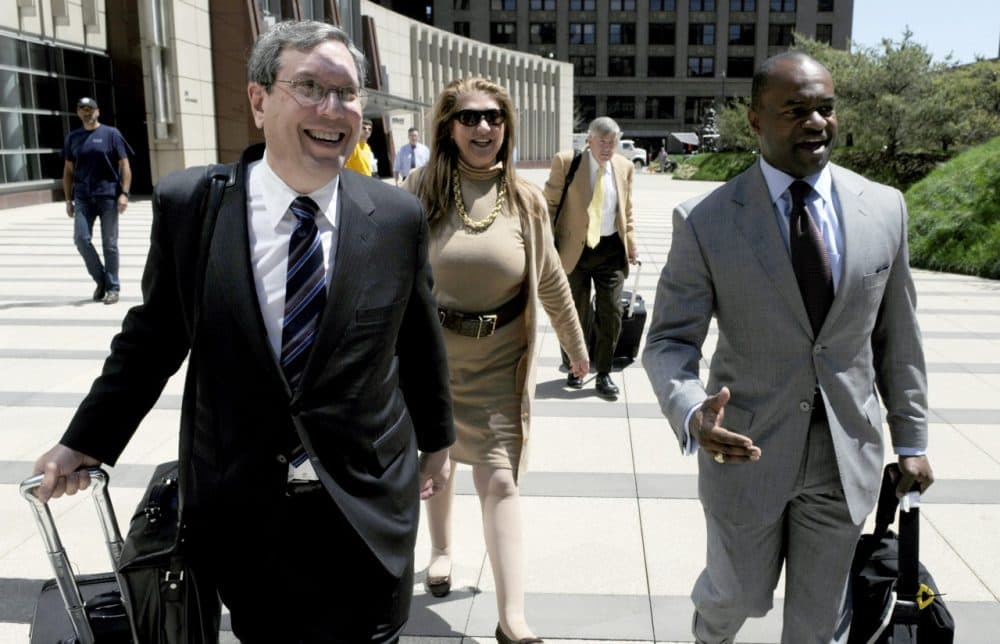Advertisement
Attorney Jeffrey Kessler Takes On The NCAA
Resume
A single 30-second TV spot during the men’s Final Four will cost about $1.5 million. The prospect of selling ads during the new College Football Playoff was so attractive that ESPN agreed to pay more than $5.5 billion over the next 12 years. As money piles up on the broadcasting side of college sports, lawsuits are piling up against the NCAA.
The latest, brought by high-profile sports labor attorney Jeffrey Kessler, claims NCAA member universities are acting as a cartel. Michael McCann, who is the legal expert for Sports Illustrated and the Director of the Sports & Entertainment Law Institute at the University of New Hampshire, joined Bill Littlefield.
BL: Michael, “cartel” is a pretty strong word. What does it mean in this context?
MM: Yeah, it is a strong term, Bill. In this context it means that NCAA and its members—including conferences and universities—have joined hands in a way that Kessler and others would say is anti-competitive. Even though they’re competitors in many ways, right? Schools play one another in sports; they compete for potential students. They’ve agreed to prevent student-athletes from making more than a certain amount through their athletic scholarship.
So there’s a cap, a cap that they’ve all agreed to, that says students can’t get more than their tuition, room and board and some other expenses but not their market value. And Kessler argues that college athletes should be like free agents in pro sports. They should be able to negotiate a value of a scholarship that’s commensurate with who they are and how good they are, not based on an artificial cap.
BL: Mr. Kessler is known for helping to bring free agency to the NFL and he negotiated the current free agency/salary cap systems in the NBA. Does his involvement lend weight to the idea that student-athletes should be considered employees?
MM: It does in the sense that Kessler’s going to fight for a while for this. He has the resources and the personal stake in terms of reputation in fighting this out to a victory--or at least a resolution that he could argue is a victory. You’re right, Bill, that he has a deep background in sports law. He was the lawyer that led to free agency in the NFL, specifically the Freeman-McNeil case. He has his supporters and he has critics but he certainly is a big name.
BL: Mr. Kessler’s suit is similar to one field last month by Shawne Alston, a former West Virginia football player. But Alston is asking for money damages while Kessler is only asking a judge to dismantle the entire system by which big-time college sports operate. Is that an easier argument?
MM: Well, possibly. And Alston’s asking, like you said Bill, for money damages, and there’s also a claim for injunctive relief in his suit as well. But the strength of the seeking an injunction in this lawsuit is that the four players who are bringing it are current players, and so they would have a more credible case for a judge to swiftly change the rules and allow them to negotiate their scholarships.
BL: Title IX could also come into play in the context of this lawsuit, right?
MM: Yeah, that’s right. And it’s not a direct issue in this lawsuit, but it’s a matter that would likely be adjudicated thereafter no matter what happens here. And the basic point there is to say if college athletes are to be paid, I think we have strong reason to believe that that will disproportionately benefit male athletes and specifically basketball players and football players. There will likely be a Title IX challenge to any system where there’s free agency in college sports.
BL: Michael, for a while now we’ve been hearing prognostications that the end of the NCAA is neigh. What are the chances that this is the lawsuit that changes things?
MM: I don’t think the NCAA is going to go away anytime soon, Bill, honestly. I think that even if college athletes are compensated more the NCAA would likely maintain some type of role, at a minimum creating rules that all schools agree to play by, hosting of championships. I would be surprised if this lawsuit or any of the lawsuits ends the NCAA, but I do think there’s a good chance the NCAA will look a lot different in a couple of years. And in some ways that may be seen as a victory for those who are suing.
This segment aired on March 22, 2014.